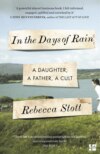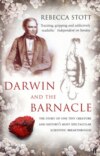Читать книгу: «In the Days of Rain: WINNER OF THE 2017 COSTA BIOGRAPHY AWARD», страница 2
2
No one would have guessed that I’d been raised in a Christian fundamentalist cult, or that my father and grandfather were ministering brothers in one of the most reclusive and savage Protestant sects in British history. So it would always be my fault if the subject came up. It might be because I’d dropped my guard, got bored, or told a story from my childhood. Of course, once it did come up, it would always be difficult to make it go away again. People were interested; they asked questions. I’d never learned how to steer around the subject.
You can’t tell just bits of it, I’d remind myself. Once you get started the whole thing starts unravelling, like a stitch in a scarf, or a story that has no beginning, middle or end. Best not to start at all. Best to keep quiet.
No matter how many times I’d try to tell it, in pieces or at length, I’d always end up baffled, feeling as though there was a part I’d left out or forgotten, a lost moral or a punchline.
‘I was raised in a cult,’ I’d say, and then I’d recoil, embarrassed by the melodrama of the words I’d used. Were the Brethren a cult? I didn’t know. What was the difference between a sect and a cult? Was there a point on a spectrum where a sect became a cult?
‘We wore headscarves,’ I’d say. ‘We weren’t allowed to cut our hair. We weren’t allowed television, newspapers, radios, cinemas, holidays, pets, wristwatches.’
The list of prohibitions always seemed endless. I’d watch people’s eyes open wider. They’d look at me askance, then compete to ask questions, and I’d think, Oh no, not this again.
‘We weren’t allowed to talk to the other children at school,’ I’d say. ‘They told us that everyone outside the Brethren was part of Satan’s army and they were all out to get us. They called them “worldly”, or “worldlies”. If you didn’t do exactly what they said, they’d expel you. Then your family wouldn’t be allowed to speak to you ever again. People committed suicide. People went mad. Yes, this was Brighton. Yes, this was Brighton in the sixties. Yes, during flower power. In the suburbs. During the sexual revolution. Yes. It’s hard to explain.’
‘You were raised Plymouth Brethren?’ people would say. They would have heard about the Plymouth Brethren. Some might even have read Father and Son, Edmund Gosse’s beautiful memoir about growing up in a nineteenth-century Plymouth Brethren assembly. And I’d hear myself reply with a hint of superiority, ‘We weren’t Plymouth Brethren. We were Exclusive Brethren.’
‘My people were the hardliners,’ I’d say. ‘Gosse was in the Open Brethren. That was nothing. They were virtually Baptist. They had pulpits and priests and adult baptisms. They were allowed to talk to worldly people, even eat with them.’
My people? Had I really just said ‘my people’?
But even if the subject didn’t come up, my Brethren childhood would rear up like Banquo’s ghost at the dinner table, refusing to be buried. At university, when I made new friends and confidantes, I couldn’t explain how I’d become a teenage mother, or shoplifted books for years, or why I was reckless, impatient, afraid of the dark, and had a compulsion to rescue people, without explaining the Brethren, the God they made for us, and the Rapture they told us was coming.
But then, I couldn’t really talk about the Brethren without explaining about my father, how he’d been a ministering brother and then become addicted to roulette when he left the sect and stopped believing in God. I’d have to explain how he’d gone to prison for embezzlement and fraud and then ended up making films for the BBC, and that on his deathbed he’d talked about a ‘Nazi decade’ and made us promise not to let anyone pray over his sleeping body.
And I could never really tell my father’s story without telling my grandfather’s – how the Scottish ships’ chandler had migrated south to supply food to the hotels of Brighton and had ended up one of the ruling members of the Brethren and running the publishing house that printed Brethren ministries.
And to explain Brethren women, I’d have to tell the story of how my great-grandmother had been sent to an asylum in Australia for forty years by her Brethren husband not just because she had epilepsy, but because she was considered too wilful. Wilfulness isn’t allowed in Brethren women, I’d say, and then I’d realise that I didn’t really know what kind of wilful she’d been.
My family, I’d tell them, have been caught up in the Brethren for a hundred years. And then I’d notice I’d just used that funny old-fashioned phrase my mother always used: caught up in.
‘But back then, of course,’ she’d say when she was remembering something about rationing or the air raids, ‘we were caught up in the Brethren.’
My family hadn’t belonged to the Brethren, we’d been caught up in them. Caught up like a coat catching on thorns. Caught up in a scandal. Caught up in the arms of the Lord. Whichever way you phrased it, it meant you didn’t get to choose, and that there was no getting away.
And then I’d be five years old again, sitting in Meeting, listening to my grandfather preaching about the Rapture. The Lord Jesus was going to take us with him up into the air in the middle of the night, he’d say. We’d be caught up in his arms. My grandfather’s usually harsh Scottish preaching voice would go soft when he talked about the Rapture. And I’d be sitting there swinging my legs on the chair in the Meeting Room, wondering how the Lord Jesus was going to lift all of us up at the same time – there were some large and sweaty people in our fellowship. The Lord Jesus would have to be a giant to be strong enough to lift my father off the ground. I’d never seen anyone do that.
After we left the cult my father sometimes tried to explain about the Brethren to people who’d never heard of them. Though he was a man who’d seize any opportunity to hold the floor, his eyes always seemed to glaze over when anyone asked him about it, as if he was bored or reading from a script. He complained that when he tried to write an Exclusive-Brethren-in-a-nutshell section in his memoir it just came out as a lump of gawky exposition. My mother refused to talk about it at all. Best to draw a line under all of that, she’d say. No use going back in there. It won’t do any good.
3
After the funeral and the wake and the speeches and the fire we burned his chair in, my brother and I ventured into my father’s study, stacked high with papers. It all had to be cleared out, my stepmother said, if the Mill was to be sold. We rescued anything that looked important from piles of unpaid bills, receipts, photographs, and instructions for long-dead appliances.
If I was going to finish his book, I told my brother, I was going to need everything that looked as if it had anything to do with the Brethren. So we shoved stacks of letters and diaries and yellowed documents into boxes without sorting through them. My brother and my son helped me carry the six boxes up three flights of stairs in my Cambridge house and slip them into the dark and dusty space under my Victorian iron bed. I’d deal with them later, I told myself. When I was ready, when I had time.
A month after my father’s funeral, my stepmother rang to say that she’d been to see the doctors about her stomach cramps. After a series of tests they had diagnosed her with bowel cancer. She’d be fine, she said. She had her cousins nearby. There’d be a course of chemo. Her cousins would drive her back and forth from the Mill to the chemo sessions. Friends would come in to help with the garden. She didn’t need me to come out there. She didn’t need anything from any of us for now. She’d let us know if she did.
How could two newlyweds, living out an Indian summer, planting a garden on the banks of a river, both have been incubating cancerous growths, his pancreatic, hers bowel? Did his cancer explain the biliousness of his behaviour, his rants and storms, the way he’d started to talk to her in those last years, his complaints about how she refused to sit and watch Shakespeare with him?
‘Perhaps she just doesn’t like Shakespeare,’ I’d said to him. ‘It’s not a crime.’
‘Midsomer Murders,’ he said. ‘Midsomer bloody Murders. That’s the level of philistinism we are talking about here.’
‘I’d watch Midsomer Murders,’ I thought to myself, ‘if the alternative was listening to you lecture me about Wilson Knight and the late plays of Shakespeare for the fourteenth time.’
I wanted to help my stepmother. We all did. But though I drove up every few weeks, I now dreaded the sight of the Mill. Puddleglum, the little second-hand cabin boat my father and I had bought together, moored on the river under the willow tree, was now covered in mildew and leaves. The lawn grass was running to seed, the birch trees wilting in the sun. The pyre where we’d burned my father’s chair had left a scorch mark and stumps of charcoaled wood on the grass. Someone needed to rake it all in and put some grass seed down.
My stepmother was struggling not just with the chemo but also with the bank. My father had left her almost penniless. I printed out the bank statement from my father’s computer a week after the funeral. He’d placed scores of online bets in those final days, most made in the middle of the night when we’d all been asleep. Just one big win, he would have been telling himself. Just one big win so that he could leave my stepmother some money with which to pay off the debts.
I reckoned up the bets. He’d spent thousands of pounds in those last weeks by moving money from one credit card to another. It wasn’t even his money; it was the last of my stepmother’s small inheritance.
I volunteered to spend an afternoon at the Mill when my stepmother was in the hospital and her cousins were away for their summer holidays. I’d mow the lawn and water the birches, I told her. It was the least I could do.
I drove slowly up the long lane that gave way to the dirt track that followed the course of the river, coal-black fen fields in one direction and rising corn in the other. I parked the car and let myself in using the key she kept under a rock near the back door. I found the mower in the shed, the blades encrusted with dried grass.
When the mower started up, the sound seemed a rude imposition on the birdsong and silence, but the smell and the stripes of mowed grass made me feel I was pushing the encroaching wilderness back a little, that I could make all of this tidy again, at least for now.
Somewhere in the heat of the day, amid the smell of cut grass and the roar of the machine, I strayed into a corner of a flower-bed. On the edge of my vision a black cloud rose up and hummed low and close, smoke-dark against the white of the birch trunks. The first sharp sting of venom broke my concentration. The second made me release the handle of the mower. It wasn’t until I’d run screaming through the empty garden, casting off my clothes, and taken refuge in the sitting room, shaking, hurt and enraged, that I examined my skin in the mirror. I counted twenty-one stings, raised, hot mounds on my arms, neck, hands. I’d run over a wasps’ nest in the dark fen soil of that garden, in the twilight of its grieving afternoon.
Can a dead man conjure wasps? Can an owl flying at dusk take a dying man’s soul? Out there in that pagan fen landscape that disgorged Roman silver plates on the ploughshare, anything seemed possible. Like the house in Alan Garner’s The Owl Service, there were unaccountable scratchings in the eaves of the Mill now, presences everywhere.
‘Leave me alone,’ I said to the empty air. ‘Leave me a-lone. I’ll finish your book when I’m ready. You can’t make me.’
The contents of those six boxes under the bed made me think of chaos, the spillage of my father’s body after his death, the gritty cremation ashes we’d scattered on the river by the Mill, the mess of his life, the impossibility of telling the Brethren story, and my own grief. They stayed down there – under the bed, gaffer-taped up.
There was so much else to do. A new job and a commute, teenagers to cook for, homework to supervise, deadlines to meet, students to teach, lectures to write and a mortgage to pay. It was two years before the letters from debt collectors and credit card companies and court summonses stopped coming, and before I stopped posting out the photocopies of my father’s death certificate with the covering letter that explained that he’d died without assets, that his debts and bills could not be paid. By then the Mill had been sold and my stepmother had gone to Australia to live near her family.
What had I actually promised him, I began to wonder. If I was going to finish his book, I’d have to describe what happened in the sixties, in that decade he couldn’t bear to look at. No one could understand the recklessness of his behaviour without understanding that. But I didn’t want to revisit that decade any more than he had. No one in the family wanted to go back there. Sometimes my father’s cousins would refer to the years we were ‘caught up in the Brethren’, or ‘living in the Jims’, or ‘living under The System’. Most of them seemed ashamed that they hadn’t seen through it at the time; some clearly felt angry and duped. Most wanted to tell me that they should have got out earlier. But no one knew, they’d say. No one knew how bad it was going to get. Then they’d change the subject. Best not to dwell on the past. Better to focus on the future.
Even if I did get a book written, the Brethren were rich and powerful. They attacked people who criticised them. They employed legal teams. When I’d once written about growing up in the Brethren for a Sunday magazine, a Brethren ministering brother had sent me a letter to say they were praying for me; that meant they knew where I lived. I’d moved house since then, but I knew they could track me down if they wanted to, wherever I was. What would my family have to say if I started asking questions about that history now? And I’d have to find a way of not writing about my mother, of steering around her, because she wouldn’t want me to make her remember any of that.
If I was going to finish my father’s story, I’d have to write about the girl I’d been in the Brethren too, because we’d both lived in that thicket, and we’d both got caught up in its cruel aftermath. I’d have to think about the days I spent listening out for the sound of Satan’s hooves on the paving stones of Brighton, for instance, or making deals with the Lord, or hoarding tins of corned beef and condensed milk in preparation for the Tribulation. I didn’t want to think about that Brethren girl in her red cardigan with brass buttons, wearing her headscarf and clutching her Bible. I’d drawn a line between me and her. My mother was right. Perhaps it was all best left well alone.
4
Four years after my father died I won a place at a month-long silent writers’ retreat in a fifteenth-century castle just south of Edinburgh. I was supposed to be writing a novel set in nineteenth-century London, but after a week sitting at a desk staring down over the castle grounds I was deleting everything I wrote, and that wasn’t much. Every paragraph felt hollowed out; every sentence threw me off.
When I walked the castle grounds at dusk, down through the bracken and the fallen and rotting trees to the peat-red river, up to the edge of the mown lawns and the flowerbeds and back round again, I heard my father reciting parts of Revelation or Ezekiel, or Yeats’s ‘The Wild Swans at Coole’, or talking about that thicket of his. His voice echoed through the east and west wings of the castle, through the woods, in the wind. These were just aural grief hallucinations, I told myself, just flickers in my neural pathways. They were nothing out of the ordinary, nothing to worry about.
In the final week of the retreat I joined the other four writers at dusk to swim in the river that curled wide and red-brown over rocks and pebbles through the castle woods. After we’d climbed from the freezing water and pulled our towels and robes around us, we followed the path up the steep riverbank into the darkening wood. I fixed my eyes on the poet’s feet ahead of me, now level with my head, as they pressed into the leaves and bracken. When his foot slipped and he stumbled slightly, I saw, or thought I saw, a plume of smoke rising slowly from a hole in the ground that he’d disturbed.
I felt the scratchings and rustlings in my hair. The first stings began. The poet behind me, dressed in a red robe, had also been engulfed. We ran through the wood back to the castle, tripping over undergrowth in the darkness, shaking our hair and pulling off our clothes, until we were sure we’d outrun them.
We’d had a lucky escape, we told ourselves over dinner. Was it, someone asked, lemon juice or ice you were supposed to put on wasp stings? Someone passed me a tumbler of whisky. I took myself to bed early. The whisky must have addled my head, I thought, because I seemed to be hearing voices that weren’t there.
At three in the morning I woke, my pulse drumming wildly in my ears, fireworks exploding behind my eyelids. When I stumbled to a mirror to prise open a single eye, my face and neck were so swollen, taut and shiny that I stumbled backwards in shock. I was struggling to breathe.
Two days later it was all over: the early-morning drive through the dark to the emergency surgery in the director’s car, the steroids, the dosage of antihistamines large enough to floor an elephant, the semi-coma I slipped into for twenty-four hours. The doctor had counted up the hard lumps on my scalp and neck. Twenty-five stings. Enough to kill someone with an allergy, almost enough to kill someone who’d been stung before in an empty garden when a smoky swarm had risen like a ghost from a hole in the ground.
Not enough to kill, I thought, but enough to make a point.
A few years earlier, I’d discovered that the man dressed in a turquoise and pink Hawaiian shirt sitting opposite me at a Cambridge dinner party was a world expert on shamanism. I’d plagued him with questions, and if I’d failed to observe the to-and-fro turn-taking of dinner-party etiquette, I was not the only one. None of us wanted to talk about anything else.
For fifteen summers he’d lived with a shamanic tribe on the Russian steppes, he told us. He’d studied shamans as they talked their dead down.
‘Talking down,’ I said. ‘What does that mean?’ Death for me had been all about going up there, the transcendent sucking up into the air, into the arms of Jesus. I thought again of the impossibility of that body-weight of my father’s going up there, going up anywhere. Even in the blood-red plastic cremation jar his ashes had been a ton weight.
The shaman expert told us that the bereaved Sora used the shaman as an intermediary to persuade the dead person to go down into the next world.
‘Like laying a ghost?’ I asked.
‘Something like that,’ he said. ‘Though it works both ways for them. The dead and the living both have to convince the other to let them go. It takes a long time.’
Until the relatives had talked down the dead person, he told us, their spirit would be hanging around the village doing bad things, provoking, making people sick, causing the crops to fail. They had to be talked down and into the ground.
In that moment I saw my huge father up on a cliff ledge somewhere, slightly drunk, swaying close to the edge, holding forth, and my siblings and me talking him down. Or trying to. Hadn’t we done that? I asked myself. Isn’t that what we’d done out there at the Mill with the Bergman and the cricket?
But I hadn’t even started. My father was still roaming. Still talking. There were swarms of wasps, acts of provocation. It would get worse. Someone was going to have to talk him down.
Бесплатный фрагмент закончился.











